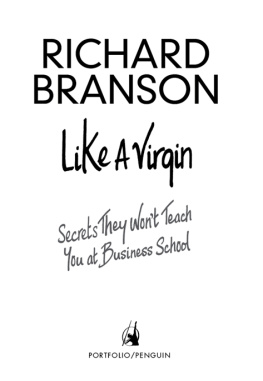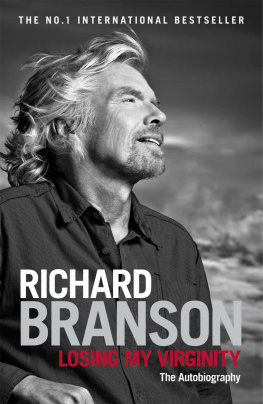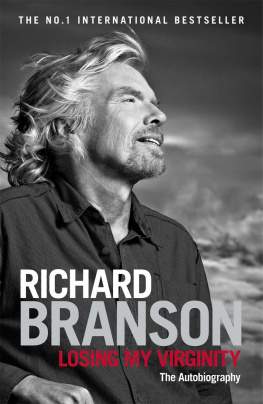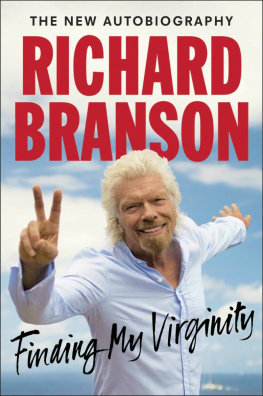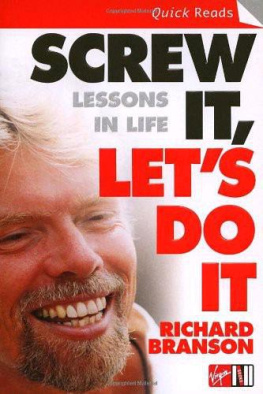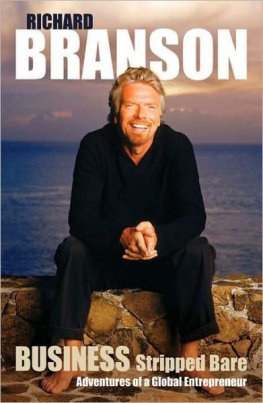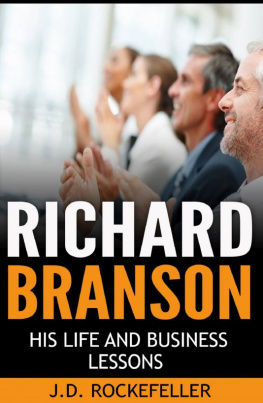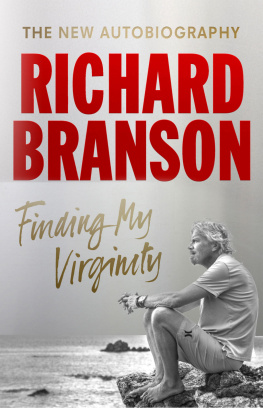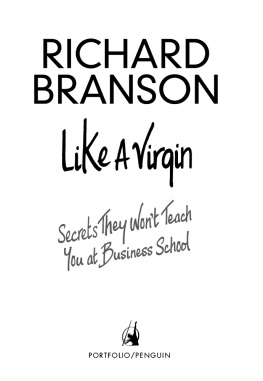Richard Branson - Like a Virgin
Here you can read online Richard Branson - Like a Virgin full text of the book (entire story) in english for free. Download pdf and epub, get meaning, cover and reviews about this ebook. year: 2012, publisher: Virgin Books, genre: Business. Description of the work, (preface) as well as reviews are available. Best literature library LitArk.com created for fans of good reading and offers a wide selection of genres:
Romance novel
Science fiction
Adventure
Detective
Science
History
Home and family
Prose
Art
Politics
Computer
Non-fiction
Religion
Business
Children
Humor
Choose a favorite category and find really read worthwhile books. Enjoy immersion in the world of imagination, feel the emotions of the characters or learn something new for yourself, make an fascinating discovery.
- Book:Like a Virgin
- Author:
- Publisher:Virgin Books
- Genre:
- Year:2012
- Rating:5 / 5
- Favourites:Add to favourites
- Your mark:
- 100
- 1
- 2
- 3
- 4
- 5
Like a Virgin: summary, description and annotation
We offer to read an annotation, description, summary or preface (depends on what the author of the book "Like a Virgin" wrote himself). If you haven't found the necessary information about the book — write in the comments, we will try to find it.
Like a Virgin — read online for free the complete book (whole text) full work
Below is the text of the book, divided by pages. System saving the place of the last page read, allows you to conveniently read the book "Like a Virgin" online for free, without having to search again every time where you left off. Put a bookmark, and you can go to the page where you finished reading at any time.
Font size:
Interval:
Bookmark:
As with everything else in my life, I am grateful to a lot of people for the inspiration behind, and the creation of, Like a Virgin. To name but a few
Thanks must go to Nick Fox at Virgin Management for constantly urging me to write it down and then sometimes taking dictation from all over the world as I took him up on the advice; and to Gloria Anderson and Patti Sonntag at the New York Times for commissioning and then syndicating some of my scribblings to more than fifty countries.
Then theres David Tait, who built Virgin Atlantic in the USA from day one and has spent the best part of thirty years correcting my English. David was a great support in helping me order my thoughts and making these outpourings readable.
Not least, my thanks go out to two more important groups. All the readers of the various publications around the world and others who have texted, blogged or emailed (one even came in on a postcard) all nature of thought-provoking comments, opinions and questions, many of which I have attempted to respond to in these pages.
And, secondly, to all the wonderful employees past and present of the Virgin Group who have helped me create our unusual family of companies and have helped me fill this book with great stories and lessons.
I hope it spurs on a new generation of entrepreneurs.
Thank you one and all.
There are two questions I get asked all the time. The most popular is How did you come to name the business Virgin? A close second is Whats your secret to successfully building businesses?
The first is easy to answer but the second one always takes some thinking about. The fact is that theres no one thing that characterises Virgins many successful ventures or, for that matter, what went wrong when we didnt get it right. Reflecting across forty years, however, I have come up with five secrets for improving the chances of a new business surviving and with luck something we all need flourishing.
Starting a business takes huge amounts of hard work and time so you had better enjoy doing it. When I started Virgin from a basement in west London, there was no great plan or strategy. I didnt set out to build a business empire. I simply wanted to create something people would enjoy using, have fun doing it and at the end of the day prayed that it would make enough to pay the bills.
For me, building a business is all about doing something to be proud of, bringing talented people together and creating something thats going to make a real difference to other peoples lives.
Business people are not unlike artists. What you have when you start a company is a blank canvas; you have to fill it. Just as a good artist has to get every single detail right on that canvas, a businessman or woman has to get every single little thing right when first setting up in business in order to succeed. However, unlike a work of art, the business is never finished. It constantly evolves and its also not that easy to paint over your mistakes!
If a businessperson sets out to make a real difference and achieves that objective, he or she will be able to pay the bills and have a successful business to boot.
Whether you have a product, a service or a brand, it is not easy to start a company and to survive and thrive in the modern world. In fact, youve got to do something radically different to make your mark today.
Look at the most successful businesses of the past twenty years. Microsoft, Google, Apple and Facebook all shook up the world we live in by doing things that had never been done before and then by continually innovating. They are now among the dominant forces.
Not everyone can aspire to such levels; however, should you decide to enter an already crowded segment you had better be ready to offer customer service that blows the competition away.
When we started Virgin Atlantic the positive buzz that we created focused on the simple fact that our crews were really nice to our passengers. Go figure what a breakthrough idea for an airline!
Businesses are nothing more than a group of people, and they are by far and away your biggest assets. In fact in probably the majority of businesses your people are your product.
For me there is nothing sadder than hearing someone being apologetic about the place where they are working. When people are proud to be associated with their company it generates a special level of advocacy and dedication that is a huge differentiator in a world full of mediocrity and indifference.
To be a good leader you have to be a great listener. Sure, you need to know your own mind, but there is no point in imposing your views on others without some debate and a degree of consensus. No one has a monopoly on good ideas or good advice.
Get out there, listen to people, draw people out and learn from them. As a leader youve also got to be extremely good at lavishing praise. Never openly criticise people; never lose your temper, and always be quick to applaud a job well done.
People flourish on praise. Usually they dont need to be told when theyve done wrong because most of the time they know it.
A good leader doesnt get stuck behind a desk. Ive never worked in an office Ive always worked from home but I am constantly out and about, meeting people. It seems I am travelling all the time but I always have a notebook handy to jot down questions, concerns or good ideas.
If Im on any of the Virgin airlines I always try hard to meet as many of the cabin crew and passengers as possible, and will usually come away with a dozen or more good suggestions or ideas. If I didnt write them down I might remember only a few, but putting them in the infamous notebook means I remember them all. Talk to your staff and customers at every opportunity, listen to what they tell you, good and bad, and act on it.
Some might say, Well, all thats easy when you have a small business, but at Virgin we strive to appoint company heads who have the same philosophy. That way we can run a large group of companies in the same way a small business owner runs a family business keeping it proactive, responsive and friendly.
Oh yes: I still have to answer that first question as to the origin of the Virgin name. Sadly theres no great sexy story to it as it was thought up on the fly. One night, I was chatting with a group of sixteen year old girls over a few drinks about a name for the record store. A bunch of ideas were bounced around, then, as we were all new to business, someone suggested Virgin. It smacked of new and fresh and at the time the word was still slightly risqu, so, thinking it would be an attention-grabber, we went with it.
But no matter how good the concept and/or brand name, even the best of them can fail at the first attempt. For example, in the early sixties, another group with a catchy name, the Beatles, were turned away by no fewer than seven record labels before they found one willing to take them on.
So, if you dont survive, just remember that the majority of new businesses dont make it and that some of the best lessons are usually learned from failure. And like the old song says, Just pick yourself up, dust yourself off and start all over again.
Finding them, managing them, inspiring them and then holding on to them is one of the most important challenges a business leader faces, and your success or lack thereof plays a vital role in the long-term success and growth of your business.
Font size:
Interval:
Bookmark:
Similar books «Like a Virgin»
Look at similar books to Like a Virgin. We have selected literature similar in name and meaning in the hope of providing readers with more options to find new, interesting, not yet read works.
Discussion, reviews of the book Like a Virgin and just readers' own opinions. Leave your comments, write what you think about the work, its meaning or the main characters. Specify what exactly you liked and what you didn't like, and why you think so.

